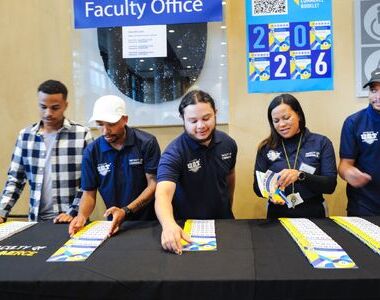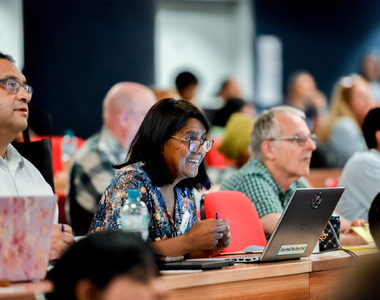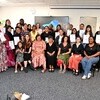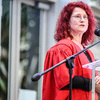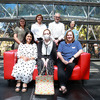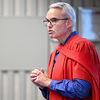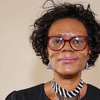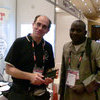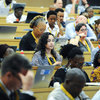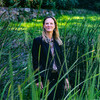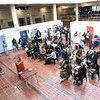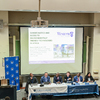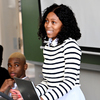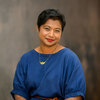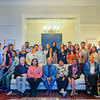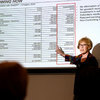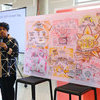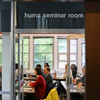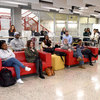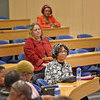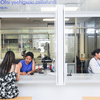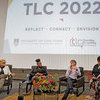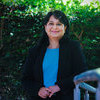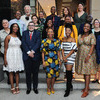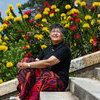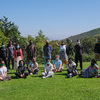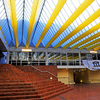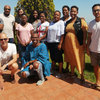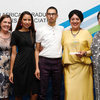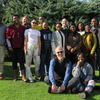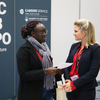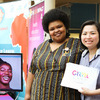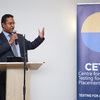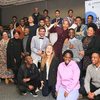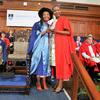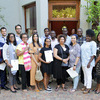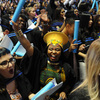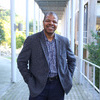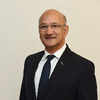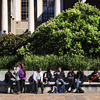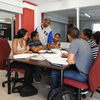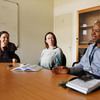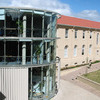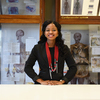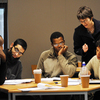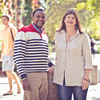TLC2025: Reshaping the future of education
21 November 2025 | Story Niémah Davids. Photos Katherine Rainers. Read time 9 min.
“Teaching and learning is at the heart of what we do. It is our first and primary purpose as a university. [Therefore,] we [need] to make sure that our teaching and learning is responsive to new knowledge, innovation, and to societal and community needs, including the needs of our students,” said the University of Cape Town’s (UCT) Vice-Chancellor Professor Mosa Moshabela.
These introductory remarks formed part of Professor Moshabela’s welcome address delivered on day two of UCT’s 14th annual Teaching and Learning Conference. Organised by the Centre for Higher Education Development (CHED), the highly anticipated event was held with the theme: “Shaping the future of education: Data-driven strategies for equity and success”. It kicked off at the School of Education (SoE) on lower campus on Monday, 17 November and proved to be a learning feast as academics and students convened for three days of robust discussion on how to shape the future of education.
Adapt or die
Moshabela’s address focused on the importance of change, and the need to make a concerted effort to adapt to new ways or working and learning. This, he said, is necessary to remain relevant and to resonate with the current crop of students who fill the university’s lecture halls and laboratories.
“If we are wanting to accommodate the needs of our students, then we have to be transformative.”
“Change is hard for us because we like to standardise. Someone once said: ‘Universities are like churches; it can be very archeage and ancient and trying to change can be very difficult’. But if we are wanting to be humane, if we are wanting to be inclusive – recognising the diversity we have; if we are wanting to accommodate the needs of our students, then we have to be transformative,” he said.
And transformation is not linear – it’s context specific. But what does transformation in the teaching and learning context look like? In examining how to be transformative, Moshabela said getting to the root of why some students feel judged based on the way they speak or their socio-economic backgrounds is important. Similarly, he said, if students want to leverage technology like artificial intelligence (AI) to learn and others highlight their mental health concerns and how they’re struggling to cope with the academic load, it’s up to the university to ask: What does transformation look like in both contexts and how can UCT support them?
Shaping the future of education
If UCT plans to shape the future of education, what does it mean in practice?
“I’m looking forward to seeing what the future of teaching and learning holds for us in the coming five years, as we navigate the contexts that we are in. The difficulty we have in terms of embracing change [is] the fact that we are so stuck in our ways,” Moshabela said.
To change things up requires work. One way of doing that is to recruit and hire a younger generation of academics who bring with them fresh, innovative ideas and ways of working; and who are able to bridge the gap between seasoned scholars and students. But young academics should not conform to old, dated teaching methods, he stressed.
“If we are going to expect them [younger academics] to do things the way we’ve always done and we are not going to give them the space to lead as young academics in the era and generation that we are in, that can accommodate the type of students that we have, then we are going to fall behind,” Moshabela said. “What we are going to find is that our students are put off by the way we teach and what we teach.”
Data for what?
As part of the morning’s session, Professor Francois Strydom, the senior director at the Centre for Teaching and Learning at the University of the Free State (UFS), delivered an impactful talk titled: “Data for what? Reimagining engagement, learning and success in South African higher education”.
Professor Strydom, who is the project leader of the South African Surveys of Student Engagement (SASSE), touched on the importance of accurate data collection to make informed decisions, including achieving student success. This, he added, was high on his to do list when he first joined UFS.
“Even incredibly wealthy students don’t have a simple journey through higher education.”
“I was told: ‘Francois, we have to do something about our success rate’… It’s an incredibly difficult problem. How are we going to address it?” he asked. “The ideal is that the student would come in and seamlessly go through into employment, which now is the reality of the privileged minority. Even incredibly wealthy students don’t have a simple journey through higher education.”
Using data to change institutions
So, the team put shoulder to the wheel to understand students’ behaviour. This process required asking them important questions related to student life, such as whether they spend time studying, and how much time they spend relaxing and socialising with their peers. The goal, Strydom said, was to understand whether students were doing what’s necessary to ensure their success. And if they weren’t, how could the university respond to change it.
“[It’s about] institutional responsiveness. So, that top and middle management [could] see [if] where they deploy money is actually making a difference. The intention here is organisational redesign. It’s about using data to change institutions,” Strydom said.
And the data doesn’t lie. He said a pre- and post-COVID-19 survey into student engagement, which UFS and 14 other universities [and 33 000 students] were part of, revealed that blended learning is the norm – students want both online flexibility and face-to-face connection. Students have also become tactical. What this means, Strydom explained, is that they prefer to plan ahead. So, they take things like traffic, the number of classes on their timetable for the day, and how much money they’ll save into consideration before deciding whether to go to campus, or to log in for an online class.
“So, this is how we can use student engagement data at a national level [to reach conclusions],” Strydom said.
The need to see students succeed
Ultimately, it all boils down to ensuring student success, at UFS, at UCT and all universities, and making sure they feel supported, especially those first-generation students who come from under resourced communities and struggle to cope once they reach university.
“They could not believe a university could care that much.”
To support these students, he said, UFS became the first university in South Africa to introduce the academic advising concept. He described academic advisors as success coaches who offer students both online and face-to-face assistance when necessary. The university also supports students via their chatbot (with integrated AI), which, he said, they enjoy interacting with “because it’s an embarrassment free zone”. UFS also tracks students’ behaviour through proactive algorithmic tracking, which picks up if they are logging in to their learning management system and whether they are online between midnight and 04:00am. The team runs the algorithm every two weeks and identifies between 2 000–2 500 students who they phone to check up on.
“[We say]: ‘Hi, Brandon. First year can be tough, how are things going?’ Initially people thought we are a Ponzi scheme. They could not believe a university could care that much. In two years [we reached] 15 000 students,” he said.
Data is sacred
Why use data, Strydom asked?
“If you’re interested in equity and quality, data presents someone’s voice and context. It’s sacred. If you don’t have data, it didn’t happen,” he said.
“Your work is consequential, everything you do in the classroom is consequential.”
“We believe that principles need to be visualised for leaders. So, design intentionally. Your work is consequential, everything you do in the classroom is consequential. The more you share data, the more you see your colleagues come alive because what you are doing with the data focus is connecting people.”
During a segment in the programme, Professor Brandon Collier-Reed, UCT’s Deputy Vice-Chancellor: Teaching and Learning, announced UCT’s 2025 Distinguished Teacher Award (DTA) recipients as Dr Kate Angier from the School of Education, Dr Chiv Gordon from the Department of Obstetrics and Gynaecology; Associate Professor Jameelah Omar from the Department of Public Law; and Dr Juana Sánchez-Ortega from the Department of Mathematics and Applied Mathematics. The award recognises exemplary teaching, and each recipient spent a few minutes talking about their journey.
 This work is licensed under a Creative Commons Attribution-NoDerivatives 4.0 International License.
This work is licensed under a Creative Commons Attribution-NoDerivatives 4.0 International License.
Please view the republishing articles page for more information.
Centre for Higher Education Development
In the news


.jpg)

































































